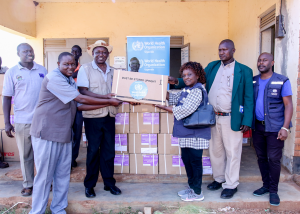WHO delivers medical supplies to support drought and food insecurity interventions in Uganda
Karamoja – The World Health Organization (WHO) Uganda has started delivering medical supplies to more than 518,000 people in the Karamoja sub-region, north-eastern Uganda, facing adverse effects arising from prolonged drought in the region.
The medical supplies include kits for pediatric severe acute malnutrition, non-communicable diseases, interagency emergency health, trauma emergency, and surgery. The kits are stocked with drugs and diagnostic reagents for malaria, tuberculosis, cholera, yellow fever, measles, meningitis, and sexually transmitted infections, among others.
Handing over the supplies to the Nabilatuk District Health Team, Dr. Nicholas Kwikiriza, the WHO Moroto Hub Coordinator, urged the team to ensure that the supplies are put to proper use to benefit people at the last mile.
“WHO pledges to always support health interventions in the region,” Dr. Kwikiriza said. “We demand that proper accountability is made of the supplies that we have delivered. We do not wish to see them being underused, misused, or unused but rather, have them benefit the people for whom they are intended.”
In 2022, over 900 people, mainly elders and children aged 3-6 died due to hunger-related causes prompting WHO to mobilize internal financial, technical, and operational resources to address the drought emergency. The medical supplies distribution exercise across the region is part of the support provided to respond to the emergency. The region continues to have the highest food insecurity and malnutrition levels in Uganda due to factors related to inadequate food access, poor dietary diversity, structural poverty, low value livelihood options, poor hygiene and sanitation, and morbidity.
Dr. Peter Lokwang, the Acting District Health Officer of Nabilatuk thanked WHO for supporting government efforts to respond to the health consequences of the drought and food insecurity.
“These supplies have come in timely, and they are very much appreciated by every political office of the district. We promise to put them to their right use as demanded by WHO to benefit our people seeking services at the various health centers in the district,” he said.
According to the 2019/20 Uganda National Health Survey, Karamoja sub-region is one of the poorest regions in Uganda, with income poverty at 66% having increased from 61% in 2017 and food poverty at 75% from 70% in 2017. The population is mainly rural, with livelihoods based on livestock and crop production, and recently a growing range of diversified livelihood activities that include mining, stone quarrying, and sale of natural resource products, among others.
Communications Associate
WHO Uganda Country Office
Email: afwcougcom [at] who.int (afwcougcom[at]who[dot]int)
Phone: +256740487734
Communications Officer
WHO Uganda
Email: tcheutchouae [at] who.int (tcheutchouae[at]who[dot]int)
